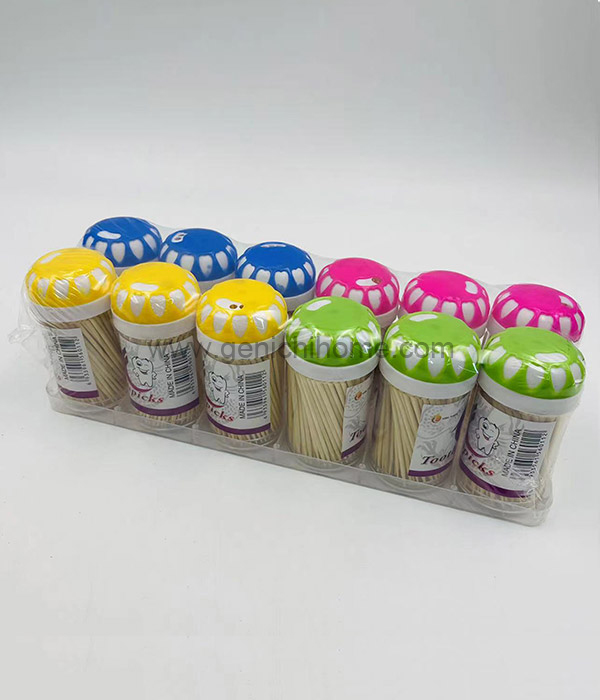Our wooden rolling pin from the rest is its ergonomic design. We have carefully engineered this product to provide control and comfort. The tapered sh...
See DetailsToothpicks may seem like a small, everyday item, but their material and quality can make a difference—both in daily use and in their environmental impact. Traditionally, toothpicks have been made from birch wood or plastic. In recent years, however, bamboo toothpicks have grown in popularity. The question is: Are bamboo toothpicks actually better? The answer depends on how you define “better,” but in many ways, bamboo has clear advantages.
1. Material Characteristics of Bamboo
Bamboo is a fastgrowing grass that reaches maturity in 3–5 years, compared to decades for hardwood trees. Its natural fibers are dense and flexible, giving bamboo products good strength without brittleness.
For toothpicks, this means:
Smooth Surface – Bamboo can be finely polished to reduce splinters.
Durability – Less prone to breaking miduse compared to some softer wooden toothpicks.
Lightweight – Easy to handle without feeling heavy or clumsy.
2. Environmental Benefits
One of bamboo’s biggest selling points is sustainability. Compared to hardwoodbased toothpicks:
Faster Regrowth – Harvesting bamboo does not kill the plant; it regenerates from its root system.
Lower Deforestation Impact – Using bamboo reduces reliance on slowgrowing trees.
Biodegradability – Like wood, bamboo is fully biodegradable and compostable, unlike plastic toothpicks that can persist in the environment for decades.
Lower Carbon Footprint – Bamboo absorbs more CO₂ and releases more oxygen than many tree species.
In a world increasingly focused on reducing plastic waste and protecting forests, bamboo toothpicks fit well into ecofriendly living.
3. Safety and Health Aspects
Bamboo toothpicks are generally safe for oral use when properly manufactured. Key points include:
NonToxic – They are free from chemical coatings and dyes if sourced from reputable producers.
Low Splinter Risk – Quality bamboo toothpicks are polished to minimize sharp fibers.
Natural Antimicrobial Properties – Bamboo contains a substance called “bamboo kun,” which has some resistance to bacterial growth.
By contrast, lowquality wooden toothpicks can sometimes splinter more easily, and plastic toothpicks may release microplastics or be less pleasant to bite on.
4. Functional Performance
When it comes to actual use—whether for cleaning teeth, serving appetizers, or holding sandwiches together—bamboo toothpicks offer several advantages:
Strength – Bamboo fibers give extra resistance to bending and snapping.
Sharpness – Tips can be finely tapered for effective cleaning.
Moisture Resistance – Bamboo can handle slight dampness without softening quickly, unlike some wood toothpicks.
These qualities make bamboo toothpicks practical for both home use and professional food service.
5. Aesthetic Appeal
Bamboo toothpicks often have a clean, natural color with a light golden tone. They can be carved, embossed, or given decorative ends for use in cocktails and appetizers. For restaurants, catering, or home entertaining, bamboo toothpicks can add a subtle but elegant touch compared to plain white birch picks.
6. Cost Considerations
Historically, bamboo products were slightly more expensive than wooden or plastic ones due to manufacturing and import factors. However, as production has scaled up—especially in Asia where bamboo is abundant—prices have become highly competitive. In bulk, bamboo toothpicks are often priced similarly to wooden ones, making them an affordable sustainable choice.
7. Limitations of Bamboo Toothpicks
While bamboo toothpicks have many benefits, there are a few considerations:
Quality Variation – Lowquality manufacturing can still result in rough or uneven tips.
Availability – In some regions, they may be less common in local stores compared to wooden picks.
Taste Sensitivity – Some people notice a faint grassy taste, though this is minimal with good polishing.
These are minor drawbacks compared to the overall advantages.
8. Comparison with Other Toothpick Types
Vs. Wooden Toothpicks – Bamboo is generally stronger, more flexible, and more sustainable. Wood may be slightly softer but can splinter more easily.
Vs. Plastic Toothpicks – Bamboo is biodegradable, safer for the environment, and more pleasant to use, while plastic is reusable but noncompostable.
Bamboo toothpicks are better in many ways—they are strong, splinterresistant, biodegradable, and ecofriendly. They perform well in everyday use, look appealing, and support sustainability goals by reducing the demand for hardwood trees and replacing nonbiodegradable plastic picks.
While no toothpick type is perfect, bamboo strikes an excellent balance between functionality, safety, cost, and environmental responsibility. For most people and most purposes, switching to bamboo toothpicks is a small but meaningful step toward a more sustainable lifestyle.
